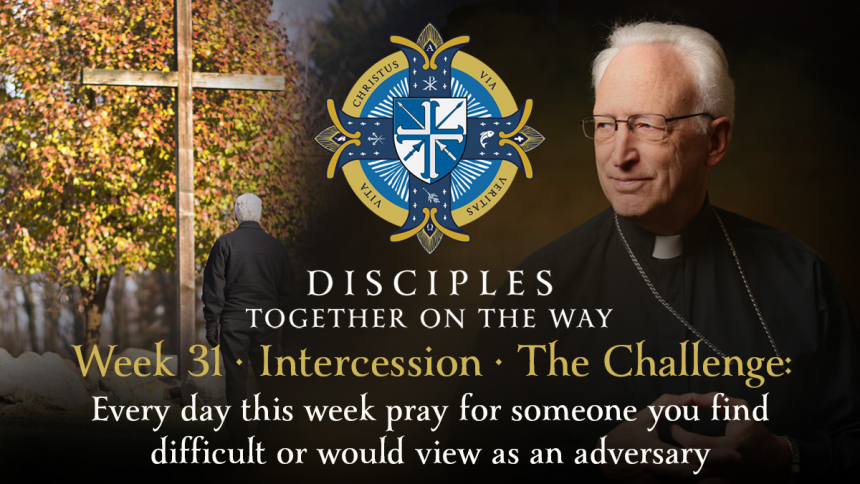
August 5, 2022
Dear brothers and sisters in Christ,
This week, as Disciples Together on the Way, we continue our journey into Intercessory Prayer. How instinctive it is to pray for a loved one who needs our help. This week, however, we will pray for someone we find difficult or view as an adversary. Not so instinctive, eh? Let me explain, however, why this week’s challenge is so important.
Let me first acknowledge that praying for someone we don’t like or, very possibly, somebody who has hurt us can be a really challenging thing to do. But, let us remember that we have been chosen to live a life worthy of the vocation to which we were called. As Saint Paul writes to the Church in Ephesus:
“With all humility and gentleness, and with patience, support each other in love. Take every care to preserve the unity of the Spirit by the peace that binds you together.” (Ephesians 4:2-3)
Our identity as beloved sons and daughters of Christ calls us to live a uniquely exceptional life, to view difficulties as things we can offer to God for our conversion. These mortifications are not always easy, nor are they meant to be. If they were, we wouldn’t need to rely on Christ for the grace to accomplish his mission in and through us. And how many of us can honestly say that we are up to the task without the help of Jesus? That answer is… none of us.
I’m sure that you, like me, know at least one person who has an uncanny knack of getting on our very last nerve. Maybe he or she is always adversarial, evoking in us an innately defensive posture. How well we handle this person depends upon many factors, not the least of which is prudence. “Fools show their annoyance at once, but the prudent overlook an insult,” says the Book of Proverbs. (Proverbs 12:16)
Are we prudent enough to discern our true good in every circumstance and humble enough to put aside our pride and will the good of the other? Do we have enough wisdom to recognize that if we don’t, it becomes an enemy of our peace, causing us to dwell on negative thoughts and emotions? Instead of focusing on being salt and light, we become fearful and introspective. We withdraw from the fullness of God’s love and cannot grow in relationship with him or our brothers and sisters. If we persist in our refusal to forgive these offenses, we continue to harden our hearts. For this reason, Saint Paul also urges the Christians of Ephesus to “Be generous to one another, sympathetic, forgiving each other as readily as God forgave you in Christ.” (Ephesians 4:32)
Unforgiveness affects our spiritual, mental, and emotional health. It can also have unexpected repercussions on our physical health. In fact, according to 2020 study by John Hopkins Medicine, forgiveness has a positive impact on our health. It stated:
“Whether it’s a simple spat with your spouse or long-held resentment toward a family member or friend, unresolved conflict can go deeper than you may realize—it may be affecting your physical health. The good news: Studies have found that the act of forgiveness can reap huge rewards for your health, lowering the risk of heart attack; improving cholesterol levels and sleep; and reducing pain, blood pressure, and levels of anxiety, depression and stress. And research points to an increase in the forgiveness-health connection as you age.”
Thanks be to God that his ways are not our ways! To repeat the quotation above from that much older source of lived wisdom, the Book of Proverbs, “Fools show their annoyance at once, but the prudent overlook an insult.” (Proverbs 12:16)
So, this week’s challenge is to pray this week for one person whom we find rather difficult. Not only is it good for our health, it is also good for our soul.
Until next week, I bless you in the name of the Father and the Son and the Holy Spirit. Amen.
Yours in Christ,
+ Earl Boyea
Bishop of Lansing
